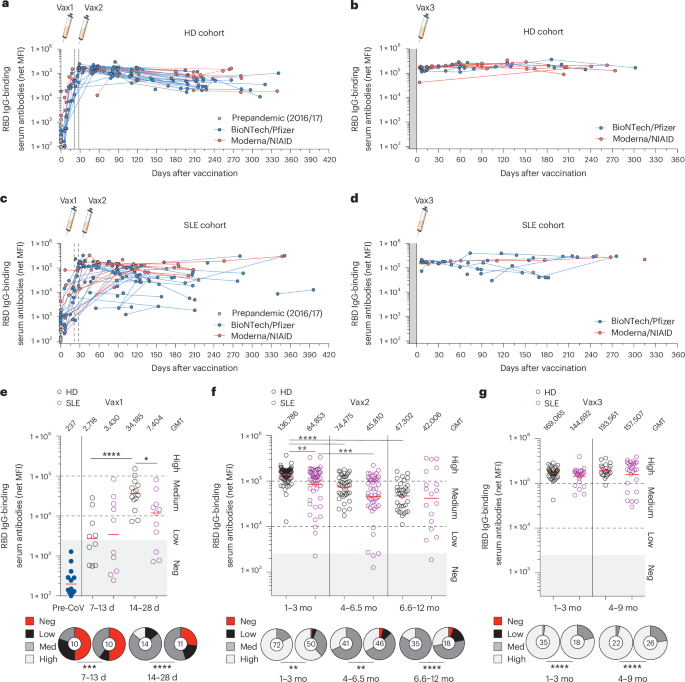疾病相关 B 细胞和免疫内型决定了人类系统性红斑狼疮患者对 SARS-CoV-2 mRNA 疫苗接种的适应性免疫反应
IF 27.7
1区 医学
Q1 IMMUNOLOGY
引用次数: 0
摘要
严重急性呼吸系统综合征冠状病毒 2 mRNA 疫苗接种在某些免疫力低下的人群中效果不佳。然而,这些缺陷背后的细胞机制以及疾病诱导的细胞异常所起的作用在很大程度上仍未得到探讨。在这项研究中,我们对接种了武汉-胡-1 单价 mRNA 冠状病毒 2019 疾病疫苗的自身免疫性系统性红斑狼疮(SLE)患者进行了全面的血清学和细胞学分析。我们的研究结果表明,系统性红斑狼疮患者的抗受体结合域抗体亲和力降低,导致中和效力和广度下降。我们还观察到,在记忆反应期间,IgD-CD27-"双阴性(DN)"DN2/DN3 B 细胞群中存在持续的抗尖峰反应,并且在系统性红斑狼疮患者中具有更大的代表性。此外,系统性红斑狼疮患者的抗尖峰T细胞免疫功能也受到了损害。值得注意的是,低疫苗效价与新产生的滤泡外B细胞和T细胞评分的较高值密切相关,这证明了不同B细胞内型的重要性。最后,我们发现通过贝利木单抗治疗进行抗BAFF阻断与疫苗免疫原性差有关,原因是抑制了幼稚B细胞的启动,并对循环T滤泡辅助细胞产生了意想不到的影响。本文章由计算机程序翻译,如有差异,请以英文原文为准。


Disease-associated B cells and immune endotypes shape adaptive immune responses to SARS-CoV-2 mRNA vaccination in human SLE
Severe acute respiratory syndrome coronavirus 2 mRNA vaccination has reduced effectiveness in certain immunocompromised individuals. However, the cellular mechanisms underlying these defects, as well as the contribution of disease-induced cellular abnormalities, remain largely unexplored. In this study, we conducted a comprehensive serological and cellular analysis of patients with autoimmune systemic lupus erythematosus (SLE) who received the Wuhan-Hu-1 monovalent mRNA coronavirus disease 2019 vaccine. Our findings revealed that patients with SLE exhibited reduced avidity of anti-receptor-binding domain antibodies, leading to decreased neutralization potency and breadth. We also observed a sustained anti-spike response in IgD−CD27− ‘double-negative (DN)’ DN2/DN3 B cell populations persisting during memory responses and with greater representation in the SLE cohort. Additionally, patients with SLE displayed compromised anti-spike T cell immunity. Notably, low vaccine efficacy strongly correlated with higher values of a newly developed extrafollicular B and T cell score, supporting the importance of distinct B cell endotypes. Finally, we found that anti-BAFF blockade through belimumab treatment was associated with poor vaccine immunogenicity due to inhibition of naive B cell priming and an unexpected impact on circulating T follicular helper cells. SLE is a heterogeneous disorder that is characterized by different immune endotypes. Faliti et al. follow the immune memory responses upon mRNA COVID-19 vaccinations in a large cohort of patients with SLE. They note that skewed immune responses, such as lower seroconversion and neutralization, might be due to extrafollicular B and T cell biases in SLE endotypes.
求助全文
通过发布文献求助,成功后即可免费获取论文全文。
去求助
来源期刊

Nature Immunology
医学-免疫学
CiteScore
40.00
自引率
2.30%
发文量
248
审稿时长
4-8 weeks
期刊介绍:
Nature Immunology is a monthly journal that publishes the highest quality research in all areas of immunology. The editorial decisions are made by a team of full-time professional editors. The journal prioritizes work that provides translational and/or fundamental insight into the workings of the immune system. It covers a wide range of topics including innate immunity and inflammation, development, immune receptors, signaling and apoptosis, antigen presentation, gene regulation and recombination, cellular and systemic immunity, vaccines, immune tolerance, autoimmunity, tumor immunology, and microbial immunopathology. In addition to publishing significant original research, Nature Immunology also includes comments, News and Views, research highlights, matters arising from readers, and reviews of the literature. The journal serves as a major conduit of top-quality information for the immunology community.
 求助内容:
求助内容: 应助结果提醒方式:
应助结果提醒方式:


